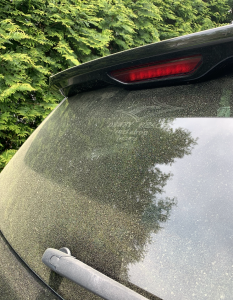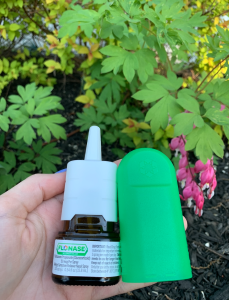Pollen. It affects all of us, one way or another.
I was pretty much immune to the side effects of pollen until a few years ago. Oh, how I wish I could go back to the days when the copious amounts of yellow powder didn’t affect my body.
What even is pollen?
Scientifically, pollen is the male fertilizing agent of flowering plants, trees, grasses and weeds. But, it’s also a major allergen and one of the main causes of seasonal allergies. Pollen is virtually invisible unless it is on a surface, so it’s hard to stay away from in the spring months. Unfortunately, learning how to live with this yellow powder is the only way to beat it.
Pollen can often be seen on cars. I have a black car and the pollen shows up a lot more on there than on my moms white car. While you can wash away pollen, it will always come back. Even when you wash it away, it turns puddles into a murky yellowish color!

What affect does pollen have on us?
One of the most frustrating things about pollen is that it affects the sinuses. This means lots of sniffling, sneezing and coughing.
For me, sinus problems are usually coupled with a swollen face and itchy eyes. Basically, my whole face goes out of commission.
While these symptoms can be uncomfortable, they can also cause further problems. For example, I did not go to one of my classes today because my eyes were so swollen and puffy that I could barely see. I did not want to be on a Zoom video call in that state.
Instead, I took a shower to try and wash away any debris or pollen on my body or in my hair from spending time outside. Something as simple as taking my dog for a walk and then laying in bed afterwards can result in the transfer of pollen from my body to my bed or other surfaces in my room. While pollen isn’t invisible, it feels like it is when you accidentally bring it inside.
What makes pollen better or worse?
Pollen is worse on some days than others. When it rains, people with seasonal allergies can usually rejoice because this means that all of the pollen in the air and on surfaces is being washed away.
While it doesn’t fully go away, the rain and moisture helps the pollen to not just be floating around in the air like it usually does. The moisture helps to weigh down the pollen and slow down its air travel.
However, heavy rain can actually make pollen levels worse. Heavy rain and winds can make pollen travel at a faster rate through the air. Additionally, the heavy rain can pound other allergens out of the ground and send them into the atmosphere.
Because of this, a light rain is best for those with pollen allergies and sensitivities. If you catch yourself in a light rain storm, go outside right after! According to Aprilaire, this is when the air will be the freshest.

How can I slow my pollen allergy symptoms?
The simple answer is to stay away from pollen, which means staying inside, which is not reasonable. Instead, it’s best to take a decongestant or an anti-inflammatory.
If over the counter medicine doesn’t work for you, you might have to go to the doctor for further assistance. My dad and I both have horrible seasonal allergies and we have found that Flonase, Benadryl and Claratin work pretty well for easing our symptoms.
As for those like me who get a swollen face and itchy eyes- try a warm compress. It helps the swelling go down and helps to soothe whatever area is bothering you. And, as always, don’t itch! I learned this lesson the hard way and got stuck with pink, swollen eyes for nearly a week.
I can’t wait for spring to be over.



Pooh on pollen! Thank you for this informative article!!